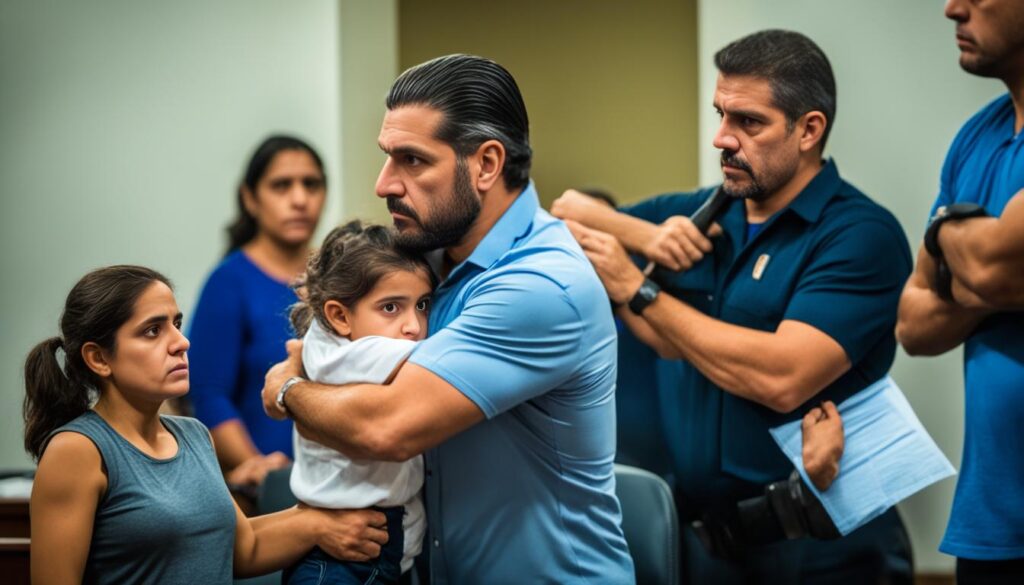

Going through a divorce or separation can be tough, but having knowledge about the legalities and steps involved can make it smoother. If you are thinking about divorcing in El Salvador, it’s important to learn about the specific rules and steps that need to be followed.
Divorce laws in El Salvador encompass various aspects, including mandatory mediation, grounds for divorce, and the division of assets and debts. By having a clear understanding of these laws, you can navigate the divorce process more effectively and protect your rights.
Under the Family Code in El Salvador, common law marriages are legally recognized. Couples who live together for three years or more are granted the same rights as married couples in terms of property and child custody. These unions, known as “non-matrimonial unions” in El Salvador, must be declared in court to benefit from the protection provided by the Family Code.
Common law marriages offer couples who choose not to marry a legal framework that safeguards their rights and interests. It allows them to establish a stable partnership, accumulate assets jointly, and raise children with shared responsibilities. However, it is crucial to note that the declaration of the common law marriage in court is necessary to enjoy the benefits and protections afforded by the Family Code.
For couples considering a common law marriage, it is advised to seek legal advice to fully understand the requirements and implications of the declaration. Legal professionals can guide individuals through the process, ensuring that all necessary steps are taken to protect their rights and interests.
Common law marriages in El Salvador provide couples with various benefits, including:
AdvertisementThe recognition of common law marriages in El Salvador provides individuals with the legal protection and rights they need to build a life together without entering into a formal marriage. It offers a flexible alternative for couples who prefer not to marry but still want to establish a committed and legally recognized relationship.
It is essential for couples considering a common law marriage to consult with legal professionals to ensure that they fulfill all the necessary requirements and complete the declaration process correctly. This will help protect their rights and interests in the event of a separation or dispute.
By partnering with a legal professional experienced in divorce cases, individuals can navigate the complexities of the legal system, protect their rights, and achieve the best possible outcome for their unique circumstances.
“In complex divorce cases, legal expertise is essential to ensure a fair division of assets and protection of rights.”

| When to Seek Legal Help: | Advantages of Legal Assistance: |
|---|---|
| Complex Asset Division | Expert guidance in determining fair distribution of assets. |
| Child Custody Disputes | Legal representation to advocate for the best interests of the child. |
| Spousal Support Negotiations | Assistance in negotiating fair terms based on financial needs. |
| Cases Involving Domestic Violence or Abuse | Legal support to ensure safety and protection of all parties. |
The divorce process in El Salvador can be a significant life event, and understanding the steps involved is crucial for a smoother transition. In this section, we will explore the key elements of the divorce process in El Salvador, including the timeline, requirements, and mandatory mediation sessions.
The divorce process typically takes around 6 months to a year, depending on the complexity of the case and whether it is contested or uncontested. It starts with filing a petition for divorce with the Family Court, where the couple seeking divorce must provide detailed information about their marriage, reasons for divorce, and any supporting evidence.
After filing the petition, couples are required to attend mandatory mediation sessions. Mediation aims to assist couples in resolving their issues amicably and reaching mutual agreements regarding child custody, asset division, and other matters. These sessions provide a valuable opportunity for both parties to express their concerns and priorities while working towards a fair resolution.
AdvertisementOnce all the legal requirements, including the mandatory mediation sessions, have been completed, the Family Court reviews the case and makes a decision. If the divorce is uncontested and both parties have reached an agreement, the court will typically approve the divorce without further legal proceedings. However, if the divorce is contested, meaning the parties are unable to reach an agreement on key issues, the court will hold hearings to determine the appropriate resolution.
It’s important to note that the divorce process in El Salvador follows the guidelines outlined in the Family Code. This code sets the legal framework for divorce proceedings, including the division of marital assets, child custody arrangements, and spousal support. Adhering to the legal requirements and guidelines is essential for a successful divorce process.

Overall, understanding the divorce process in El Salvador can help individuals navigate the legal system with confidence and clarity. Seeking legal advice, complying with the Family Code, and engaging in mandatory mediation sessions can contribute to a smoother and more equitable divorce experience.
| Key Steps in the Divorce Process |
|---|
| 1. File a petition for divorce with the Family Court |
| 2. Attend mandatory mediation sessions to resolve issues |
| 3. Complete all legal requirements outlined in the Family Code |
| 4. Await the court’s decision and resolution |
By following these steps and seeking professional guidance, individuals can navigate the divorce process in El Salvador effectively and ensure their rights and interests are protected.
When going through a divorce in El Salvador, child custody and support are crucial aspects that require careful consideration. The well-being of the child and their best interests are prioritized in determining custody arrangements.
The Family Code of El Salvador takes various factors into account when determining child custody. These factors include the child’s age, their relationship with each parent, and the ability of each parent to provide for the child’s physical and emotional needs.
AdvertisementChild custody can be awarded to one parent (sole custody) or both parents (joint custody). In joint custody cases, the court aims to ensure that both parents actively participate in making important decisions regarding the child’s upbringing.
In situations where one parent is granted sole custody, the non-custodial parent may still have visitation rights. The court will determine a visitation schedule that allows the child to maintain a relationship with both parents while considering their best interests.
Additionally, child support is often awarded to ensure the child’s financial well-being. This support is typically provided by the non-custodial parent and is determined based on various factors, including the income and financial resources of both parents.
For instance, let’s consider a scenario where the court determines that the non-custodial parent should provide child support. If the non-custodial parent’s income is significantly higher than that of the custodial parent, the court may calculate child support by considering a percentage of the non-custodial parent’s income.
| Non-Custodial Parent’s Monthly Income | Child Support Percentage | Calculated Child Support Amount |
|---|---|---|
| $5,000 | 25% | $1,250 |
It’s important to note that child custody and support arrangements can vary depending on the unique circumstances of each case. Consulting with a family law attorney in El Salvador is recommended to ensure that the custody and support agreements align with the best interests of the child and comply with the relevant laws.
Advertisement
In a divorce case in El Salvador, the division of marital assets and debts plays a significant role in ensuring a fair and equitable settlement. Typically, these assets are divided equally between spouses, unless there is a prenuptial agreement that explicitly outlines a different arrangement. This division encompasses various types of assets, such as property, financial accounts, investments, and personal belongings.
It is important to note that the division of assets is not limited to tangible possessions alone but also includes intangible assets like intellectual property, pensions, and retirement funds. The specific division process can vary depending on the complexity of the case and the willingness of both parties to cooperate.
Furthermore, the division of marital debts is an integral part of the overall asset division process. Both spouses are responsible for equally sharing the burden of marital debts accumulated during the marriage. This may include mortgages, loans, credit card debts, or any other financial obligations.
| Asset | Estimated Value (in USD) | Division |
|---|---|---|
| Family Home | 250,000 | Shared Equally (125,000 each) |
| Joint Bank Account | 50,000 | Shared Equally (25,000 each) |
| Investment Portfolio | 150,000 | Shared Equally (75,000 each) |
| Vehicle | 30,000 | Shared Equally (15,000 each) |
Note: The above table is an example and does not represent actual asset values or divisions.

It is always advisable to consult with legal professionals to ensure a fair and legal division of assets and debts in an El Salvador divorce case. Their expertise can help navigate the intricacies of the process and protect one’s rights and financial interests.
Spousal support, also known as alimony, plays an important role in divorce cases in El Salvador. It serves as a financial lifeline for one spouse who requires assistance to maintain their standard of living after the divorce. The determination of spousal support takes into account various factors, including the length of the marriage, the earning capacity of each spouse, and their financial needs.
During divorce proceedings in El Salvador, a court may order one spouse to make regular payments to the other spouse for a specified period of time. These payments are designed to provide financial stability and support to the economically disadvantaged spouse. The purpose of spousal support is to help individuals transition into their new lives and ensure a fair and equitable outcome.
Advertisement“Spousal support acts as a safety net for individuals who may have sacrificed their own careers or earning potential for the benefit of the marriage.”
When determining the amount and duration of spousal support, the court considers the financial resources and earning capacity of both spouses. Factors such as the length of the marriage, the age and health of each spouse, and their respective contributions to the marriage are also taken into account. The goal is to establish a support arrangement that is reasonable and fair for both parties involved.
It is important to note that spousal support is not automatically granted in every divorce case in El Salvador. The court carefully evaluates the specific circumstances and needs of each individual before making a decision. This ensures that the support awarded is appropriate and aligned with the unique circumstances of the divorce.

Overall, spousal support provides crucial support to individuals facing financial challenges during and after divorce. It helps bridge the gap between the financial resources of each spouse and promotes fairness and stability in the aftermath of a marital dissolution.
| Factors | Description |
|---|---|
| Length of the marriage | The duration of the marriage is a significant factor in determining the amount and duration of spousal support. Longer marriages may result in higher support amounts. |
| Earning capacity | The court takes into account the earning potential of each spouse when calculating spousal support. This includes factors such as education, work experience, and employability. |
| Financial needs | The financial needs of both spouses are evaluated to ensure that the support awarded is sufficient to maintain the standard of living established during the marriage. |
| Contributions to the marriage | The court considers the contributions of each spouse to the marriage, including non-financial contributions such as homemaking, child-rearing, and support during the other spouse’s education or career advancement. |
| Other relevant factors | The court may also take into account other relevant factors, such as the age and health of each spouse and their ability to become self-supporting. |
Modifying a divorce settlement in El Salvador after it has been finalized can be complex but is possible under certain circumstances. Changes in financial circumstances or child custody arrangements may warrant a modification. However, it is important to consult with legal professionals to navigate the process and ensure compliance with the law.
When life circumstances change significantly after a divorce settlement is finalized, it is possible to seek modifications to ensure fairness and adequacy. Changes in financial situations such as job loss, significant changes in income, or unexpected expenses can impact the ability to comply with the original settlement. Additionally, when it comes to child custody arrangements, modifications might be necessary to provide the best possible environment for the children involved.
In El Salvador, the court will typically require evidence of substantial change in circumstances before considering a modification to a divorce settlement. It is essential to gather relevant documentation and present a convincing case to support the modification request.
AdvertisementConsulting with legal professionals experienced in family law is crucial when seeking to modify a divorce settlement. They can provide guidance on the legal requirements, help gather the necessary evidence, and navigate the court procedures. By working with knowledgeable attorneys, individuals can ensure that their rights are protected and that the modification process is handled effectively.

The process of modifying a divorce settlement in El Salvador generally involves the following steps:
Remember, it is crucial to consult with legal professionals experienced in family law to understand the specific requirements and procedures for modifying a divorce settlement in El Salvador.
When going through a divorce or separation in El Salvador, it’s essential to have access to reliable resources that can provide guidance and support. Fortunately, there are several organizations and institutions available to help individuals navigate the challenges of divorce. Whether you need legal advice, emotional support, or practical resources, these entities can offer valuable assistance.
The El Salvador Bar Association is a professional organization dedicated to promoting the legal profession and providing support to lawyers and the general public. They can offer guidance on divorce laws, connect you with experienced attorneys, and provide valuable resources to help you navigate the process.
The Family Court in El Salvador plays a vital role in resolving family law matters, including divorce and separation cases. They can provide legal guidance, explain the procedures involved, and assist individuals in understanding their rights and responsibilities during the process. The Family Court’s expertise in family law matters makes them an invaluable resource for those going through divorce.
AdvertisementCasa Alianza is an organization that offers support and resources to vulnerable populations, including individuals experiencing domestic violence or abuse. They can provide counseling, shelter, and legal assistance for those in need. If you’re facing a difficult situation in your divorce or separation case, Casa Alianza can offer a safe space and the support you require.
CEJIL (Center for Justice and International Law) is a nonprofit organization that focuses on supporting human rights causes in the Americas. They provide legal resources, advocacy, and litigation services for individuals and organizations fighting for justice. If you’re facing complex legal issues during your divorce, CEJIL can offer guidance and support.

Having access to these resources can make a significant difference in your divorce or separation journey. Whether you need legal advice, emotional support, or practical resources, reach out to the El Salvador Bar Association, the Family Court, Casa Alianza, or CEJIL for assistance. Remember, you don’t have to face the challenges of divorce alone.
Navigating the intricacies of divorce laws in El Salvador can be a challenging and complex process. However, by understanding the requirements, procedures, and rights involved, individuals can ensure a smoother transition and protect their interests.
One crucial step in this journey is seeking legal assistance. Consulting with experienced professionals who specialize in divorce law in El Salvador can provide valuable guidance, advice, and representation throughout the process. These professionals can help navigate the legal complexities and ensure that all necessary steps are followed.
Understanding the division of assets and debts is another critical aspect. Marital assets, including property, finances, and other assets, are typically divided equally between spouses, while debts are allocated based on individual income and financial contributions. Being aware of these factors can help individuals make informed decisions and protect their financial interests.
AdvertisementFurthermore, child custody and support must be carefully considered. In El Salvador, child custody decisions prioritize the best interests of the child and take factors such as the child’s age, relationship with each parent, and their ability to provide for the child’s needs into account. Additionally, spousal support, or alimony, may be awarded based on factors like the length of the marriage, earning capacity, and financial needs of each spouse.
The divorce and separation laws in El Salvador govern the process of legally ending a marriage or living separately. They include requirements, procedures, and rights for individuals going through these processes.
Yes, common law marriages are legally recognized in El Salvador under the Family Code. Couples living together for three years enjoy the same rights as married couples in terms of property and child custody.
You may require legal assistance in divorce cases in El Salvador if you are facing complex asset division, child custody disputes, spousal support negotiations, or cases involving domestic violence or abuse.
The divorce process in El Salvador typically takes around 6 months to a year, depending on the complexity of the case and whether it is contested or uncontested. It involves filing a petition for divorce with the Family Court, attending mandatory mediation sessions, and complying with all legal requirements outlined in the Family Code.
AdvertisementChild custody in divorce cases in El Salvador is determined based on the best interests of the child. Factors such as the child’s age, relationship with each parent, and the ability of each parent to provide for the child’s needs are taken into account.
Marital assets in divorce cases in El Salvador are typically divided equally between spouses, unless there is a prenuptial agreement specifying otherwise. The division may include property, finances, and other assets. Similarly, marital debts are divided between spouses based on factors such as individual income and financial contributions during the marriage.
Yes, spousal support, also known as alimony, may be awarded in divorce cases in El Salvador to one spouse who requires financial assistance after the divorce to maintain their standard of living. The amount and duration of the support are determined based on factors such as the length of the marriage, the earning capacity of each spouse, and their financial needs.
Yes, modifying a divorce settlement in El Salvador after it has been finalized is possible under certain circumstances. Changes in financial circumstances or child custody arrangements may warrant a modification. It is important to consult with legal professionals to navigate the process and ensure compliance with the law.
The El Salvador Bar Association and the Family Court can provide legal guidance and support for individuals going through divorce and separation. Additionally, organizations such as Casa Alianza and CEJIL offer support and resources for individuals in need during the divorce process.
AdvertisementIn understanding divorce law Colombia, it’s important to note that El Salvador and Colombia have different legal systems, resulting in different divorce laws. While both countries allow for no-fault divorces, the specific processes, requirements, and regulations may vary. It’s crucial to consult a legal expert for accurate information.

Lywjyb Birdgot Divorce Gift Break Up Gift Old Keys Won't Open New Door Divorce Party Gift for Best Friend Sister (Divorce Gift)
Amazon

Amazon

Sarah’s voice is one of the first you’ll encounter at How Get Divorce, and it’s one you’ll come to trust. As a writer, she brings relatability and approachability to complex topics, making them understandable for everyone. As our Community Moderator, Sarah fosters a welcoming and supportive environment, encouraging open dialogue and connection among our members. Her ability to relate to others and moderate discussions makes her an integral part of our team and community.